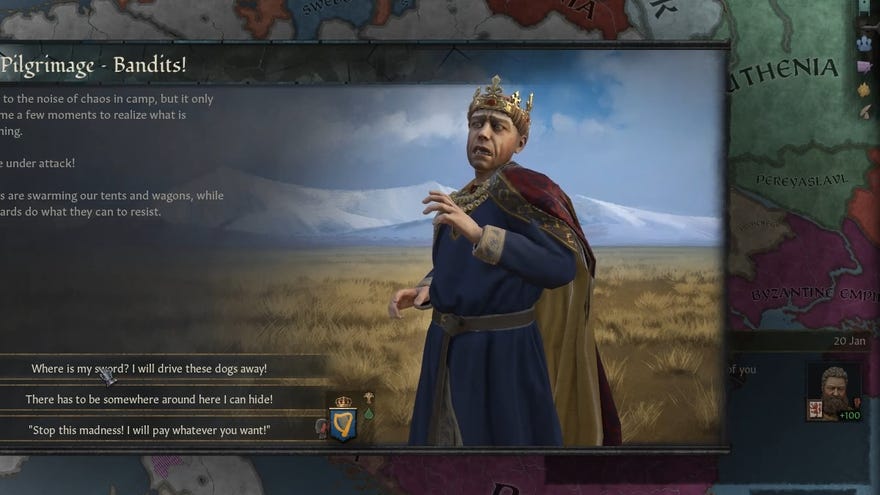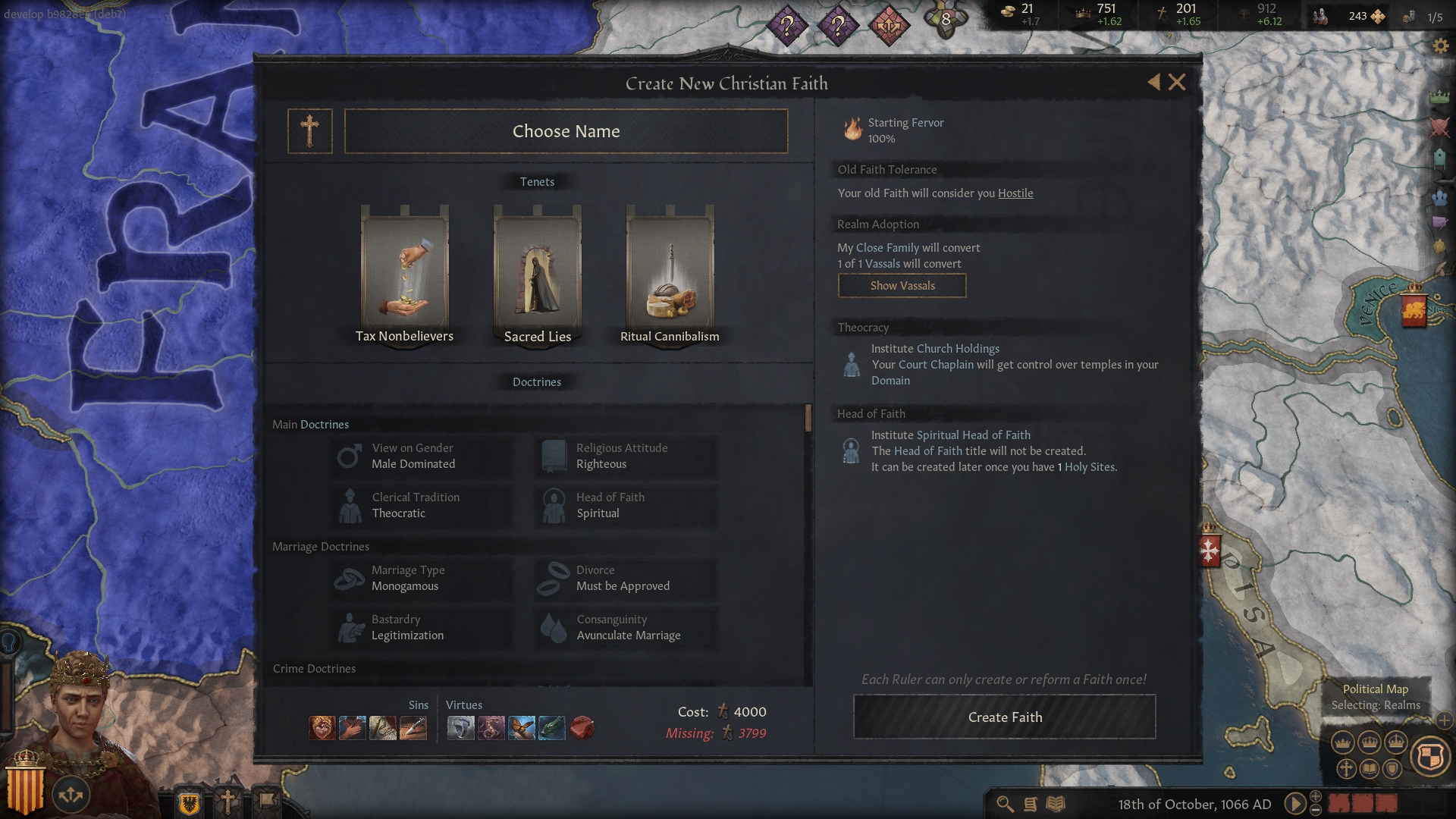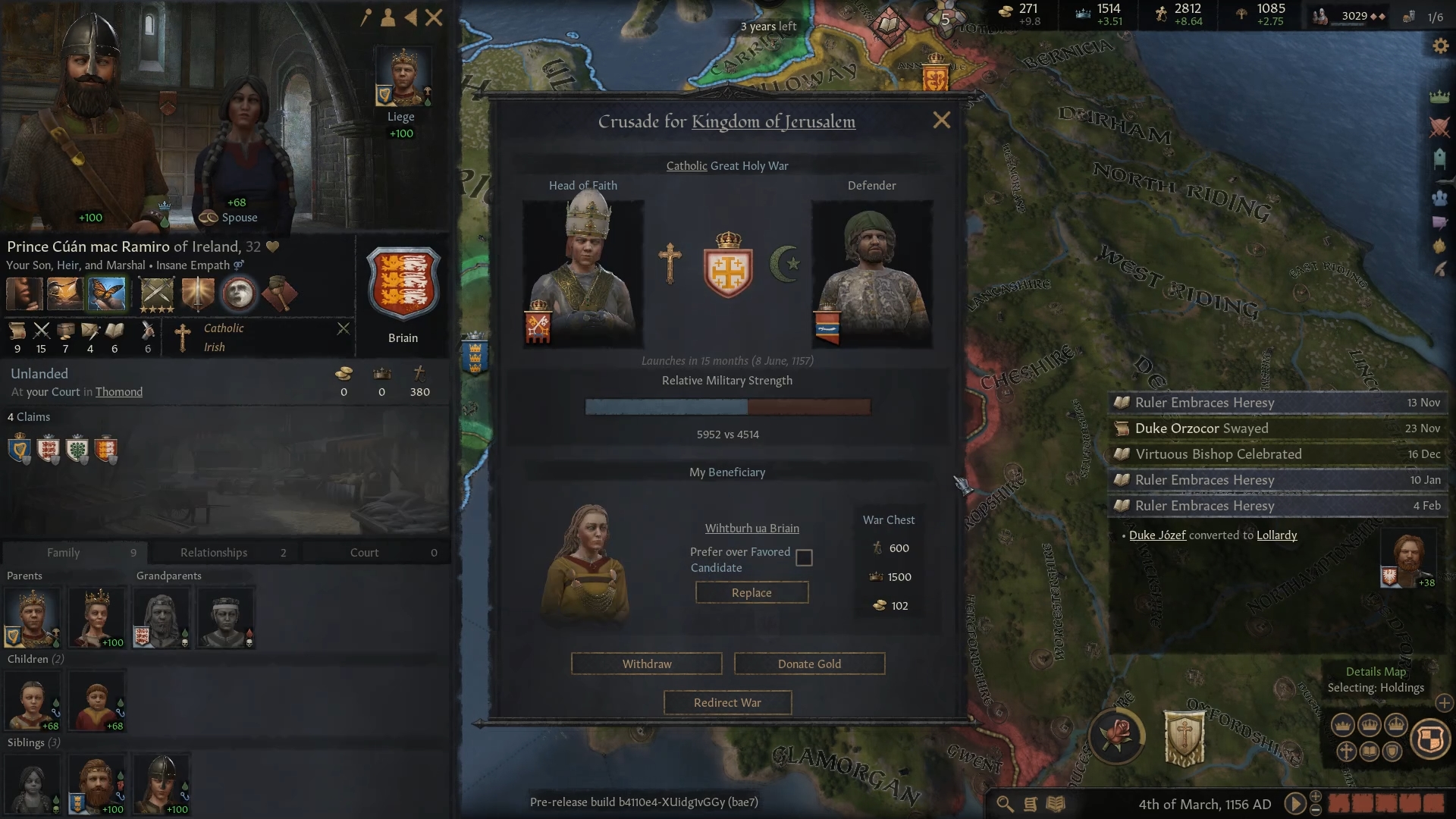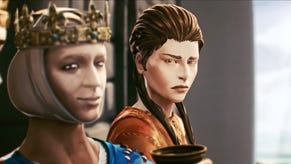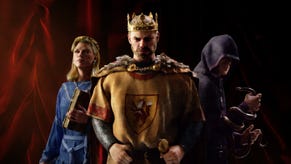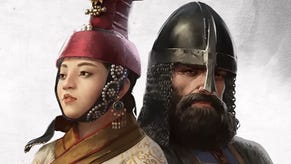Hands-on preview: Crusader Kings 3 is the RPG that will suck you into grand strategy
Gadzooks etc.
Crusader Kings 3 is coming on September 1st, and after having access to an early build for a few days, I’m seriously impatient to get back to scheming, disinheriting, and declaring myself the new pope. It’s got that terrible magic that leads to all-day-and-half-the-night sessions, and that’s largely because, secretly, it’s two games at once. It’s a strategy game, obviously. But it’s also a roleplaying game, and a really good one at that. So was 2012’s Crusader Kings 2, of course. But developers Paradox have been shrewd in identifying what made that weird hybrid work as it evolved through fifteen expansions, and have put it front and centre in CK3 from day one.
As it stands, CK3 is one of the few RPGs I’ve played that genuinely compelled me to try thinking like my character would, rather than just pushing for optimal outcomes. And it swiftly achieved what CK2 only managed at its best, in making me feel more invested in my pretend family of medieval gits, than I did in the nation they were ruling. And on top of all that, CK3 simply does a much better job of explaining itself than most of Paradox’s historical titles do. I think it’ll succeed in bringing previously reticent newcomers into the subgenre, but not by sacrificing complexity or depth. It is, quite straightforwardly, a well-designed game.
Before we get going, I should warn you: this post will not explain CK3’s features in exhaustive detail, or conduct a meticulous compare-and-contrast with CK2. For a start, it would take all day, and for seconds, we’ve already done loads of that, as have Paradox themselves. Instead, I want to give you a straightforward impression of what it’s like to play, that doesn’t rely on you already knowing CK2 back to front. Because if you’ve always been interested by so-called Grand Strategy games, but found them too inscrutable to really get into, Crusader Kings 3 could well be your Rosetta Stone.
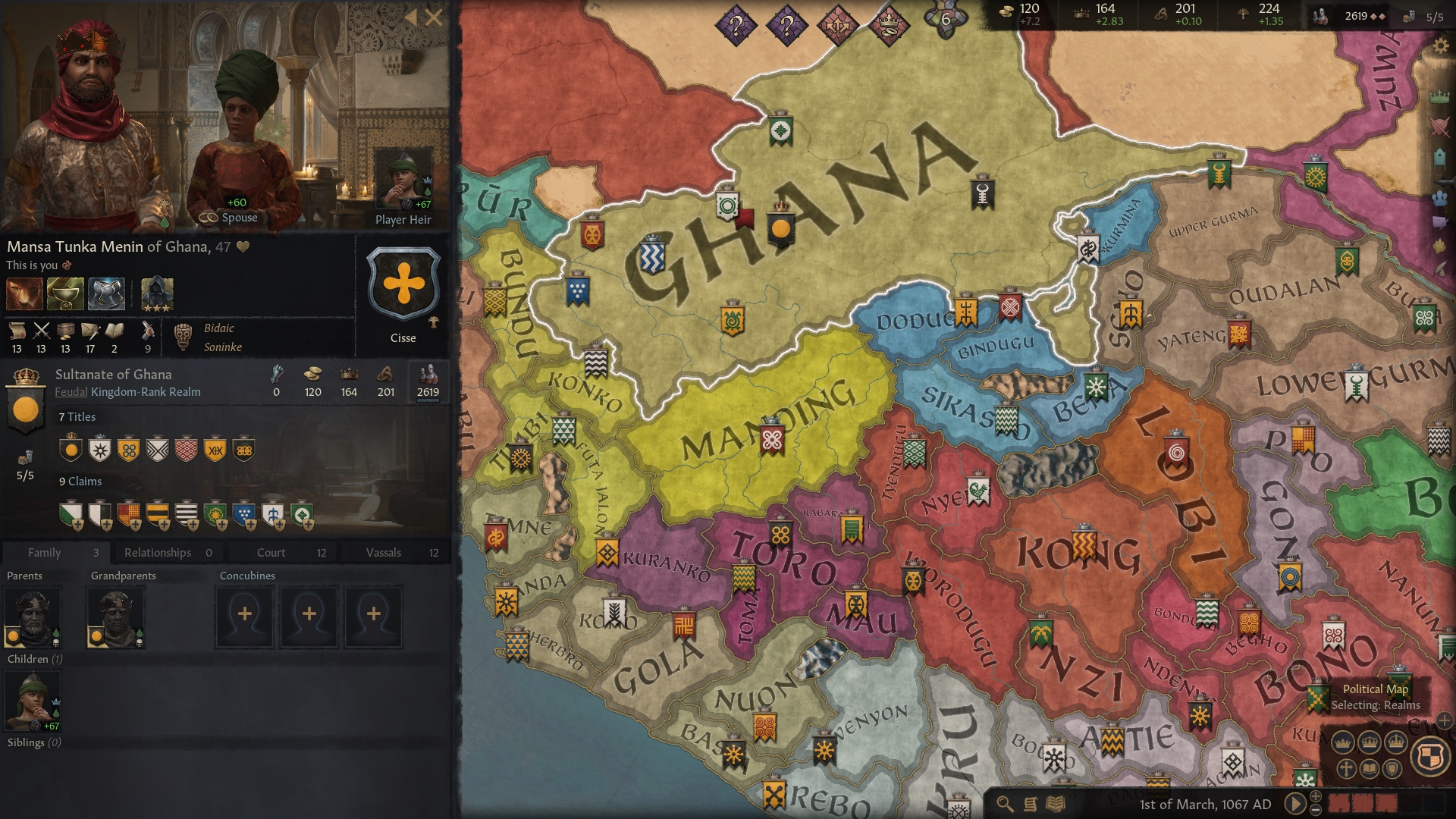
In brief, it’s a game where you control the successive inheritors of a medieval dynasty from the Early Middle Ages, through several hundred years of wars, religious schisms and backroom stabbings, until the world can’t reasonably be described as medieval any more. You view that world via a sprawling, top-down map, where you’ll have lands to manage, cities and strongholds to build, wars to fight, and diplomatic relations - with powers both foreign and internal - to handle. There’s a fair bit of clicking on the map to build farms, move armies and the like. But the really juicy elements of play take place through portraits: 3D pictures of kings and that, attached to a whole raft of statistics, traits and simulated genetics, and pokeable via drop down action menus.
There’s always a portrait of your own character in the bottom left, which gets old and haggard and mangled as the years go by. But you can also bring up portraits of any of the world’s thousands of simulated characters by clicking on their name or territory, whereupon you’re offered a window containing a sort of bizarro medieval CIA briefing on them, with all their foibles and capabilities summarised, and where you're given options to interact with them on a personal or a state level. You can negotiate with them, scheme against them, marry them, suck up to them for cash, convert them to heresy, or even befriend them. You can do a lot, in short, and it’s through these means that you achieve both your own mortal aims, and the longer-term goals of your dynasty. And the latter are mega important. Because when you die, your control switches to your inheritor, who’ll be a whole new person with (hopefully) much of the same territory under their command, but with a whole new set of characteristics, ambitions, opportunities, and disasters waiting to happen.
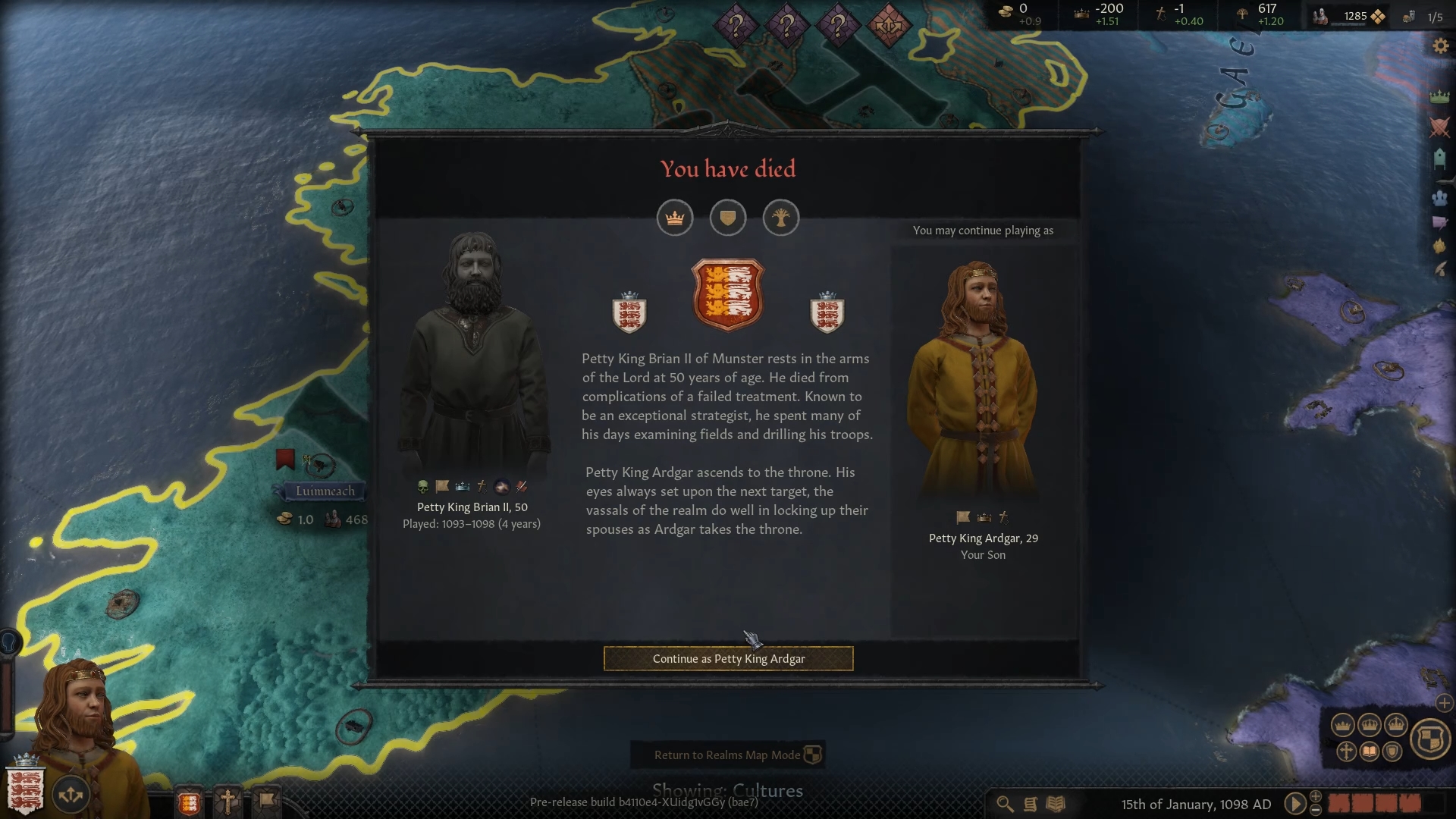
CK3 does a much better job than CK2 of making your long-term dynastic play feel meaningful and rewarding. Your actions in life build up your various traits as ruler, such as piety and prestige, for example, which determine what opportunities come your way and how you can react to them. But some actions also build the reputation of your bloodline, and can have repercussions for hundreds of years. If you’ve been blessed with a surfeit of children, let's say, it’s well worth marrying them off to distant empires, since even though there might be little in it for you in the short term, it'll mean spreading your name and your DNA across the world. This develops your dynasty’s reputation (which, like everything in a Paradox game, is tracked with a tidy little number that changes slowly over time according to a swarm of fractional modifiers), and as it rises, all sorts of little bonuses will start nudging at the edges of the things you do. Gain Kardashianesque levels of familial fame, and you’ll start unlocking persistent perks that benefit all your descendants, from increased martial ability through to longer life, better chances of inheriting positive genetic traits, and being literally dreadful.
It always pays to think a generation ahead. Since every character has a modelled personality of their own, which develops as they grow up, you can spot the real maniacs in line for the throne early, and find creative new ways to deal with them. Put them at the head of an army headed towards certain death... then panic as they become a revered war hero after a surprise victory. Disinherit them... then die in a toilet stabbing when you forget their best friend is the spymaster. Lumber them with a matrilineal union to the unlovable scion of some dump on the rough side of Norway... then watch as everything falls apart in a frenzy of claim-pressing from the fjords, when you you die from a burst face after botched eye surgery, conducted on the advice of a physician you forgot was a halfwit.
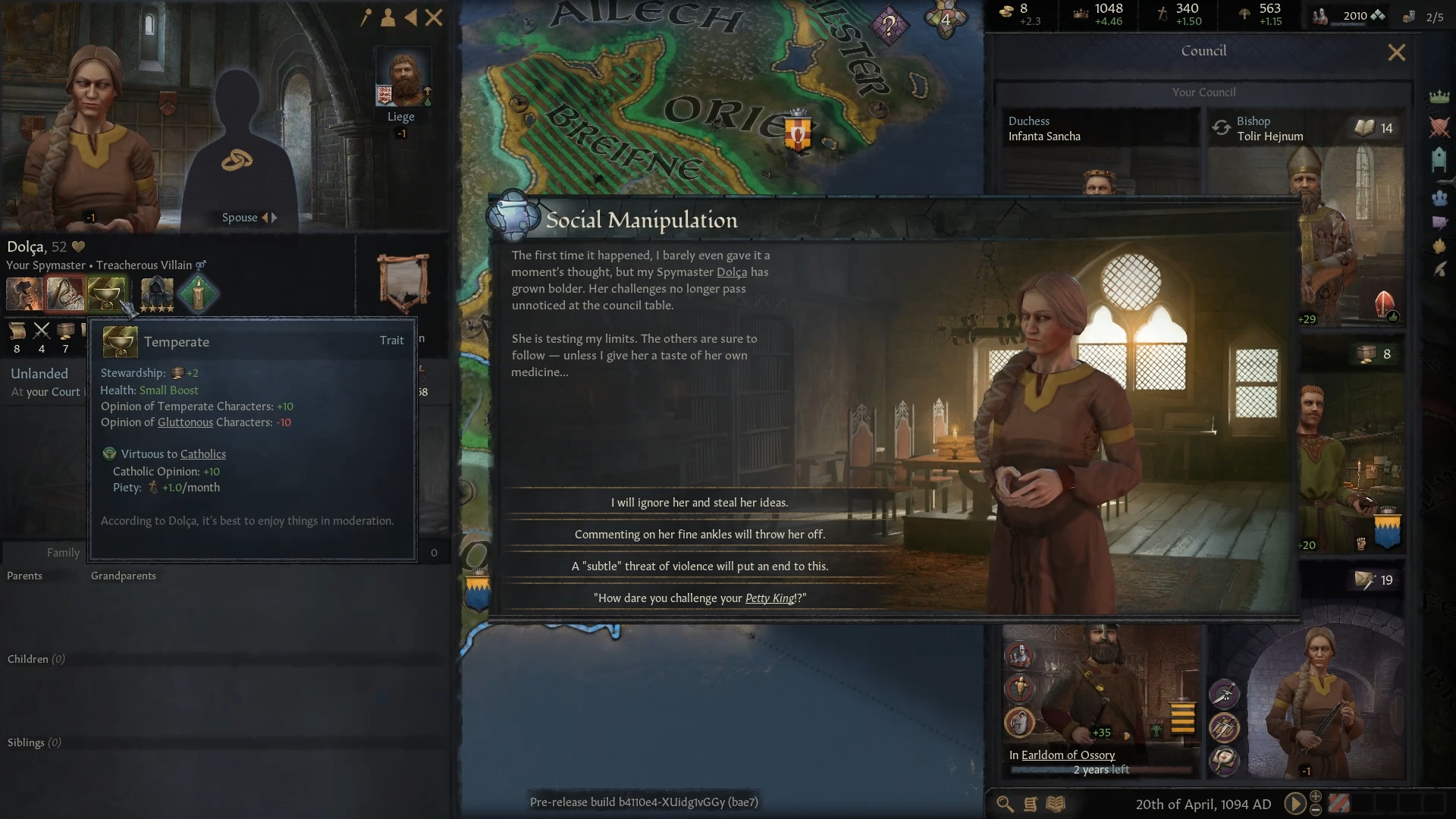
As you can imagine, there's limited worth in having too concrete a masterplan. In heir management, as with so many other areas of the game, every decision you make spreads its causal tendrils to a dozen other quietly tracked little variables, and while most of the effects are transparent enough, you can't have that many butterflies flapping all the time, and not expect to cop a few hurricanes. Soon, you come to accept that even the most stable period can come crashing down around your royal ears with just a few misjudged calls, and you come to relish the improvisation and adaptation that comes with a sudden death.
With the future ever in flux, then, it generally pays to follow your whims if you want to, rather than play it safe. And the game does plenty to let you really throw yourself into the personality of your ruler. You're never forced to act in character, but if your ruler has the "greedy" trait, say, and you choose to respond to a famine by handing out bread to the peasants, you'll take stress. Stress accumulates, and can cause you to lose your mind if you don't find ways to manage it, so you're often thrown into fascinating dilemmas between rational acts of national benefit, and moral bankruptcy that serves your own or your family's ends.
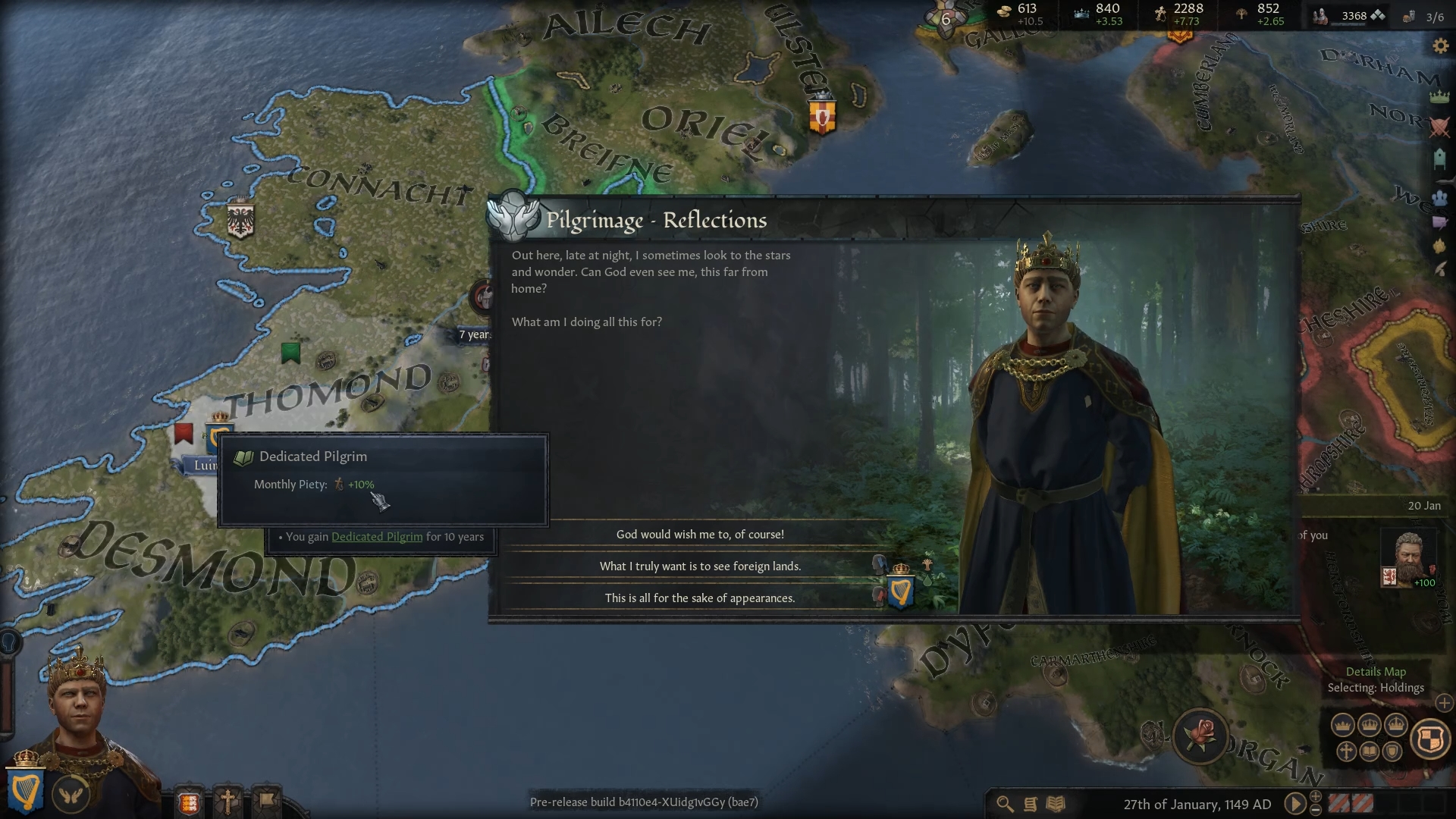
Your ruler's character will have an effect on virtually every action you take in CK3, meaning it's always at the front of your mind. When my third ruler died (of a burst eye that got infected, funnily enough), he was succeeded by a tax fanatic lothario who cared about two things: making the kingdom wildly rich, and shagging everything in existence. When he finally died, somehow not of a venereal disease, his replacement was a quiet, pious son I'd largely forgotten about after handing over to be educated by a bishop. The new, holier king immediately spent the land's entire treasury on building churches, going on pilgrimages, and funding crusades. Of course, this delighted the pope, who started beating his door down to give him money, leaving the kingdom richer than it had been even before this good Christian spending spree.
I'll stop there, because I'm just telling stories now. But that's the thing; CK2 was so good because it was more fun to treat it as a story generator than as a game about winning by painting more of the map your colour than anyone else's, and CK3 leans even more intensely in the direction of the former. It's not in any way lacklustre as a strategy game, mind. Combat has been made a lot more enjoyable, with fewer protacted sieges needed to seize enemy territory, and a diversification in army composition beyond "make the biggest stack of men possible and wade into battle". There are now men-at-arms, permanent bands of specialised, professional soldiers who are less numerous but much better than peasant-comprised levies, and knights. Knights are characters from the wider game who also fight in your armies, with their martial skill directly affecting combat. They make things more tactically interesting, but they also tie warfare closer to roleplaying, as your biggest human problem might also be a complete beast on the battlefield, leading to yet more interesting dilemmas.
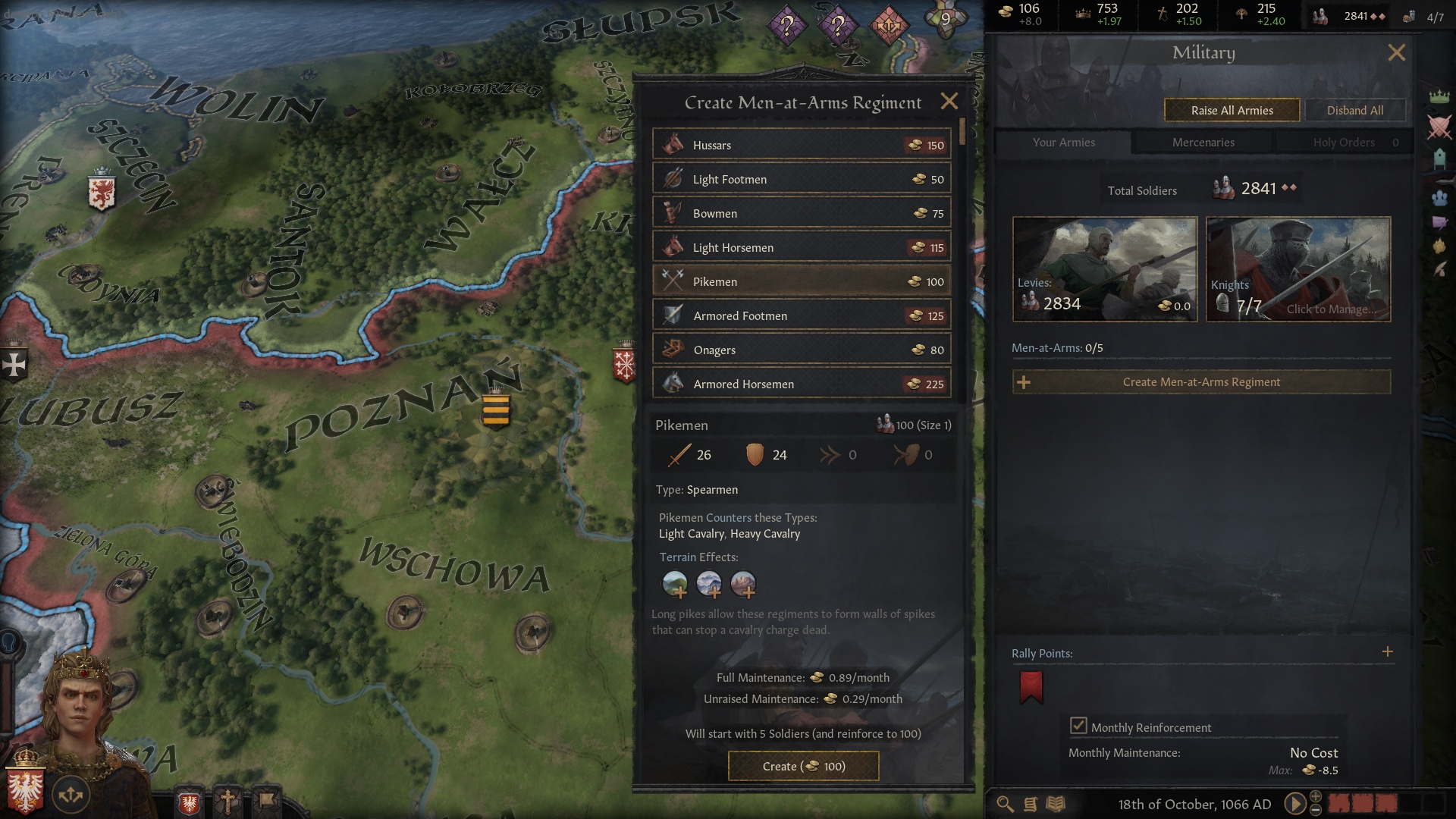
Of course, the problem with having all these teeming, interlinked systems is how to make sense of it all, especially for new players. CK2 was notoriously opaque to many unfamiliar with the wider genre, and could be a headache even for veterans, with important actions and information tucked away in unexplained places, and a wealth of succession law and feudal dynamics to comprehend in order to have any idea what belonged to who. CK3 makes an impressive effort to rationalise things, with a UI redesigned pretty much from the ground up, an in-game encyclopaedia, and an absolute onslaught of tooltips in every line of text. Plus, the tutorial genuinely teaches you the game this time, which is nice.
All in all, the information you need to understand something is rarely more than a click away, and the UI is constructed to help you avoid missing out on interesting options available to you. Most notably, an "advice" button at the top, should you enable it, keeps track of what wars you can start, which vassals are miserable with you, and other things you could use reminders of. Oh, and I like the new building system, too. I've never really enjoyed building or development in Paradox's historical games much, but either through redesign or just presentation, I found castle-building and the like a lot more interesting in CK3.
There are issues with the game. Despite the "you can do anything" ethos that applies so well to most of it, there's often a hidden qualifier of "if you're extremely powerful", which works against the idea that it should be fun to play as a ruler of even a tiny territory. The new customisable religion feature, for example, which allows you to construct your own creed in a staggering degree of detail, is great fun. But it's also practically useless unless you're a superpower, since as soon as you adopt anything other than the standard flavour of faith followed by all your neighbours, you'll immediately be beasted into the stone age for doing a heresy. The same goes for the titular crusades, which appear to be a thankless task unless you're one of the biggest nations behind them. Of course, these gripes are situational - in the limited time I had with the preview build, it might be that I just didn't happen to play through a point where the right opportunities were available.
Further to that, there are a couple of universal issues. For all that it's been improved, combat is still a bloody quick way to completely undo hours of work with one error, and while it's not a design flaw, it can still feel anticlimactic at times. Expansion wars, even when successful, are often a job that needs to be done rather than a treat. Succession, titles, and territory also remain confusing, despite the game's very best efforts at spelling out how the feudal system works. I'm happy to accept that I'm just a bit thick when it comes to abstract legal concepts, and maybe that's all that's keeping me puzzled when trying to work out what titles will pass where after a ruler's death. But still, that whole side of the game is just a mass of similar-looking heraldic shields to me, and I often decided just to shrug and accept the consequences, rather than spend too long trying to figure it out.
But that's where CK3's dual nature shines. Because in the moments where it does dance beyond the reach of comprehension as a strategy game, it's still absolutely solid as an RPG. The character game is so intriguing, you find yourself taking a robustly "so be it" sort of attitude, throwing yourself into situations that might well be disasters, simply because they're definitely what your character would do. Interesting responses lead to more interesting choices, and actions become their own reward, as opposed to tools to be deployed drily in pursuit of a slightly wider kingdom. And that, I think, is why CK3 stands a good chance of being a hit with newcomers, without alienating fans of its predecessor. While it doesn't tame the complexity at its heart, it certainly makes it a lot easier to stay in the saddle.
Caveat: Paradox have asked that I remind you that the game as pictured is still in development, and all visuals are subject to change.
